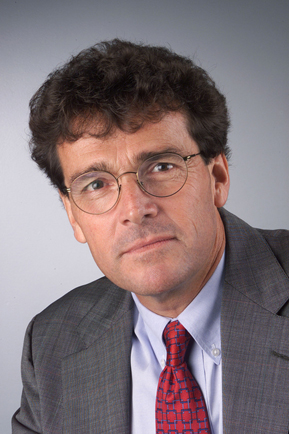Pulitzer Prize–Winning Newsman to Lead COM
Former Miami Herald editor Tom Fiedler (COM’71) named dean

Boston University’s College of Communication welcomed back one of its own this week, naming Tom Fiedler, former executive editor of the Miami Herald, its new dean.
“I cannot tell you how thrilled I am about this,” says Fiedler (COM’71). “It was at COM that I learned the skills that set me off on a career in journalism and gave me the appreciation of what that profession meant.”
On June 1, Fiedler will succeed Tobe Berkovitz, a COM associate professor of communication, who was appointed dean ad interim in September 2006 following the resignation of Dean John Schulz.
“Tom brings to his new position the fresh external perspective of a distinguished, visionary professional journalist. I am absolutely delighted that he is on board,” says University Provost David Campbell. “He is inheriting a college that, thanks to the excellent stewardship of Dean ad interim Tobe Berkovitz, is primed to work collectively to move COM forward to still greater levels of excellence.”
Berkovitz praises his successor as a “consummate professional, a person with strong ties to BU, and someone with a thorough understanding of the role that COM plays at this University.”
Fiedler, a member of BU’s Board of Overseers, was selected from 75 applicants reviewed by a search committee made up of BU faculty and two COM students.
“Tom Fiedler is extremely thoughtful, very knowledgeable about the College of Communication, and collegial in his management style,” says Louis Lataif (SMG’61, Hon.’90), Allen Questrom Professor and Dean of the School of Management, who led the committee. “He earned a professional reputation as a world-class journalist, a newsroom leader of impeccable integrity, and a person who leads effectively and steadfastly, not by fiat but by consensus.”
University President Robert A. Brown applauds the choice of Fiedler to lead COM. “I am optimistic that Tom will lead us into the innovative world of communications in the 21st century,” he says.
Fiedler’s career in journalism began in the 1970s. After graduating from the U.S. Merchant Marine Academy with a bachelor’s in engineering, he earned a master’s in journalism at COM. He joined the Miami Herald, where he would work for more than 30 years, as an investigative reporter, a political columnist, the editorial page editor, and finally, the executive editor, from 2001 to 2007.
In 1987, after presidential hopeful Gary Hart told journalists asking about marital infidelity to follow him around, Fiedler and other Herald reporters took him up on the challenge and exposed Hart’s campaign-killing affair with a Miami model. The next year, Fiedler received the Society of Professional Journalists’ top award for his coverage of the 1988 presidential election. Three years later, his investigative work was part of a Herald series on a religious cult, which earned the paper a Pulitzer Prize. The Herald’s entire staff won another Pulitzer in 1993 for the paper’s coverage of Hurricane Andrew.
As the newspaper’s executive editor, Fiedler was a stickler for journalism ethics, particularly after reporters working for the Herald’s Spanish-language sister publication, El Nuevo Herald, were found to be on the payroll of a U.S. government–owned anti-Castro news service in 2006. Fiedler also pushed his reporters and editors to embrace the Internet as a critical means of news delivery, rather than as just an appendage of the newspaper.
He has also embraced new media in his current position as a Visiting Murrow Lecturer and Goldsmith Fellow at Harvard University’s Shorenstein Center on the Press, Politics, and Public Policy, where he investigated the impact of the Web on the presidential primary system and is now teaching a graduate course on the intersection of media, politics, and public policy. In addition, Fiedler is codirector of a project, sponsored by the Carnegie Corporation and the Knight Foundation, exploring the future of journalism education, which will be concluded next month.
Fiedler has maintained a close connection with BU. In 2003, he received a COM Distinguished Alumni Award, and in 2005, the college presented him with the Hugo Shong Lifetime Achievement Award in Journalism. In 2006, he was elected a member of BU’s Board of Overseers (a position he assumes he’ll now relinquish). In addition, he chaired a 2007 external review committee that looked into whether COM’s structure and mission were well aligned, including the question of whether the journalism department should break away from the college’s film and television and mass communication, advertising, and public relations departments.
In general, Fiedler says, the committee found that COM, a college of 2,350 students and 168 faculty, suffered from “a lack of leadership continuity,” but rejected the proposal that the journalism department strike out on its own.
“Our strong belief was that there are many more strengths and synergies that will arise from the college remaining as it is than could possibly flow from having journalism as a separate school,” he says.
Although Fiedler is reluctant to discuss specific goals he’ll pursue as dean, he raises the issue of COM’s aging facilities. “The building and the physical space at COM should be truly reflective of the professions the college serves and the technology that is part of communications today,” he says. He plans to spend a lot of time listening in the months ahead. “I want to make sure that I have access to the best thinking,” he says, “and to make sure that I have some consensus on whatever changes I might suggest.”
Chris Berdik can be reached at cberdik@bu.edu.
Comments & Discussion
Boston University moderates comments to facilitate an informed, substantive, civil conversation. Abusive, profane, self-promotional, misleading, incoherent or off-topic comments will be rejected. Moderators are staffed during regular business hours (EST) and can only accept comments written in English. Statistics or facts must include a citation or a link to the citation.